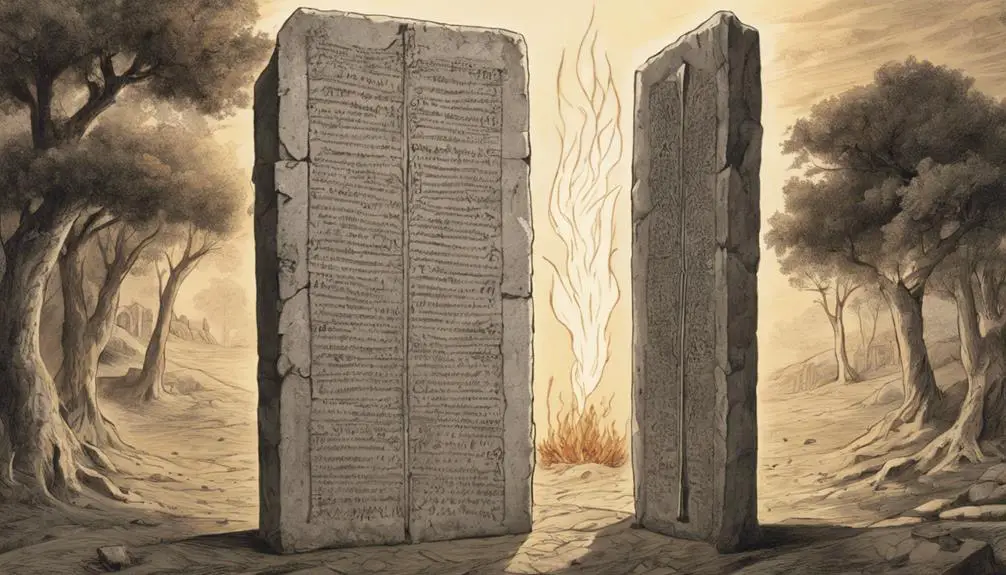Observe the Ten Commandments' origin and context in the Bible, sparking a journey of faith and understanding by identifying their specific verses.

Which Bible Verse Talks About the Ten Commandments
Biblical verses bring a bounty of wisdom and guidance, but do you know which verses specifically mention the Ten Commandments? These important directives, handed down to Moses on Mount Sinai, are found in two key sections of the Old Testament.
You might be surprised to learn where they're nestled and how their context can shape your understanding. So, where should you turn in the Bible to find these pillars of faith? Let's start a discussion that could lead us all to a deeper comprehension of these divine decrees.
Key Takeaways
- The Ten Commandments are found in the Bible's Exodus chapter 20 and Deuteronomy chapter 5.
- These commandments were issued directly by God to Moses on Mount Sinai.
- The commandments guide spiritual and social conduct, influencing societal norms and legal systems.
- Interpretations and applications of these commandments have evolved but remain crucially relevant in modern Christianity.
Origin of the Ten Commandments

Delving into the origins of the Ten Commandments, we find ourselves transported back to the biblical times of Moses, a pivotal figure who, according to Exodus 20:1-17, received these divine laws directly from God on Mount Sinai. These laws, you'll find, aren't merely a list of do's and don'ts, but a profound moral code that has shaped societal norms and legal systems for millennia.
The Ten Commandments, or Decalogue, as they're often called, are believed to have been written on two stone tablets, a symbolic representation of the covenant between God and his people. You'll note that the commandments are divided into two sections – the first four pertain to one's relationship with God, while the remaining six focus on interpersonal relationships.
Analyzing the significance of this division, it's clear that the commandments are designed to foster both spiritual and social harmony. They form a balanced blueprint for ethical living, emphasizing both piety and respect for fellow humans. As you delve deeper, you'll see that the Ten Commandments are intrinsically tied to the concept of justice, a theme that's woven throughout the biblical narrative, thus underscoring their enduring relevance in contemporary society.
Exodus: The First Mention

Where do we first encounter the Ten Commandments in the Bible? The answer is in the book of Exodus, specifically in chapter 20. Here, you'll find the earliest written account of these divine laws, as received by the prophet Moses on Mount Sinai.
Historically, Exodus is considered the second book of the Pentateuch, the first five books of the Bible, also known as the Torah. Its authorship is traditionally ascribed to Moses himself, though some modern scholars debate this claim. Nevertheless, its significance remains undiminished.
The Ten Commandments are presented in Exodus 20:1-17. They emerge within the narrative of the Israelites' escape from Egyptian bondage, a key event in their collective memory. The laws themselves are issued directly by God to Moses, who then conveys them to the people. These commandments range from prohibitions against idolatry and the misuse of God's name, to mandates regarding the Sabbath and familial respect, and injunctions against murder, adultery, theft, false witness, and covetousness.
This first mention of the Commandments in Exodus isn't just a list of rules. It's a profound covenant, a sacred agreement between God and His chosen people, shaping their identity and destiny.
Deuteronomy: The Second Mention

Turning the pages further, you'll encounter the Ten Commandments once again, this time in the book of Deuteronomy, the fifth book of the Pentateuch. Specifically, you'll find them in Deuteronomy 5:4-21.
The second mention of the Ten Commandments in Deuteronomy is not a mere repetition. The Deuteronomic version provides additional details and slight variances in the language used, which suggests a different context and audience. Moreover, it's written in a more personal tone, which creates a sense of immediacy and directness.
Let's analyze these differences further using a simple table:
Commandment in Exodus |
Commandment in Deuteronomy |
Notable Differences |
|---|---|---|
Remember the Sabbath day, to keep it holy. (Exodus 20:8) |
Observe the Sabbath day, to keep it holy. (Deuteronomy 5:12) |
Exodus uses "Remember", Deuteronomy uses "Observe" |
Honor your father and your mother. (Exodus 20:12) |
Honor your father and your mother, as the LORD your God commanded you. (Deuteronomy 5:16) |
Deuteronomy adds "as the LORD your God commanded you" |
You shall not covet your neighbor's house; you shall not covet your neighbor's wife… (Exodus 20:17) |
Neither shall you covet your neighbor's wife. You shall not desire your neighbor's house… (Deuteronomy 5:21) |
Deuteronomy changes the order and uses the term "desire" instead of "covet" for the house. |
These differences in Deuteronomy's Ten Commandments, while subtle, are worth your attention. They provide a richer understanding of the Commandments' meaning and application.
Interpretation of the Ten Commandments

Building on our understanding of the differences in the Ten Commandments as presented in Exodus and Deuteronomy, let's now examine how these commandments have been interpreted over time, considering their cultural, historical, and theological contexts.
Firstly, you'll find that interpretations differ between Christian denominations. For instance, Catholics separate the first two commandments about idolatry and God's singularity, whereas Protestants combine them. Similarly, interpretations can differ between Judaism, where the command about Sabbath observance has been strictly defined, and Christianity, where it's often seen more abstractly as a day of rest and worship.
Secondly, historical context also plays a role. For example, the commandment against murder has been variously interpreted to include a prohibition against all killing, or only unlawful killing, reflecting different societal attitudes towards violence and capital punishment.
Lastly, theological interpretations have evolved over time. The commandment against coveting, once seen as a literal prohibition, is now often viewed metaphorically, as a warning against unchecked materialism and avarice.
These varied interpretations show that the Ten Commandments aren't static, but alive, changing and evolving as they're reinterpreted in different cultural and theological contexts.
Relevance to Modern Christianity

In the ever-evolving landscape of modern Christianity, the Ten Commandments continue to serve as a moral compass, shaping ethical standards and influencing personal conduct. You might think that the commandments, given centuries ago, are out of touch with today's society, but you'd be mistaken.
Despite the significant changes in cultural norms and societal values, the core principles encapsulated in these commandments remain crucially relevant. They've been interpreted and reinterpreted, yet they remain foundational to Christian ethics.
Consider the commandment 'You shan't kill.' In the face of escalating violence globally, this commandment's relevance is undiminished. It serves as a stern reminder of the sanctity of life, urging you to respect and protect it.
Or take the commandment against lying. In an age of 'post-truth' and 'alternative facts,' honesty is even more critical. This commandment encourages you to uphold truth and integrity in your interactions.
The Ten Commandments aren't just ancient rules; they're enduring ethical guidelines. They challenge you to live a life of reverence, respect, honesty, and love. They're more than just historical artefacts; they're vital to your moral navigation in the complexity of modern life.
Conclusion
In conclusion, you've delved into the origins of the Ten Commandments and discovered their first mention in Exodus 20:2–17 and their second in Deuteronomy 5:4–21.
You've analyzed their interpretation and understood their continual relevance to modern Christianity.
You've grasped that these commandments are a guiding light, an ethical code that, even thousands of years later, influence Christian values and behaviors, making them integral to the faith's moral fabric.



Sign up